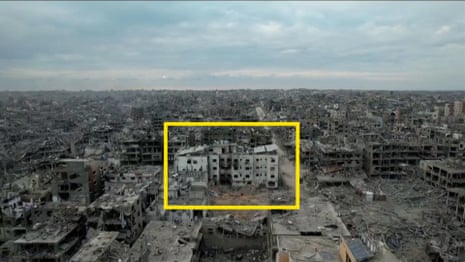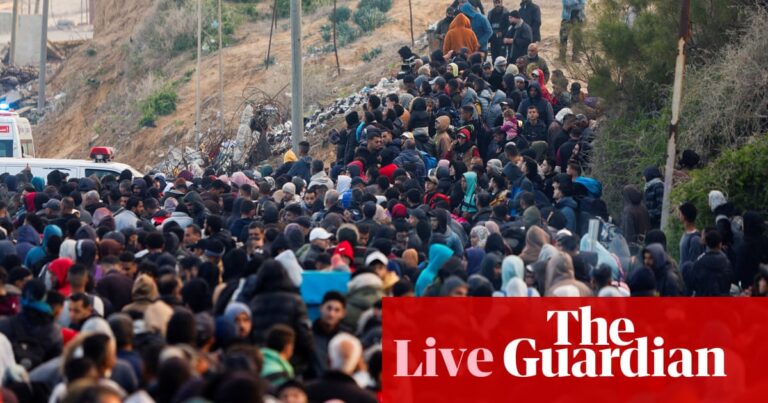Hamas says Israel is violating ceasefire by blocking Palestinians’ return to northern Gaza
Hamas has accused Israel of violating the fragile Gaza ceasefire agreement by preventing tens of thousands of Palestinian people from returning to their homes in the northern part of the strip.
“The occupation is stalling under the pretext of prisoner Arbel Yehoud, despite the movement informing mediators that she is alive and providing all the necessary guarantees for her release,” the Palestinian militant group said in a statement. “Hamas holds Israel responsible for the delay in implementing the agreement,” it added.
Hamas freed four female Israeli soldiers on Saturday, and Israel released about 200 Palestinian prisoners.
But Israel said another hostage, the female civilian Arbel Yehoud, was supposed to have been released ahead of the soldiers, and that it would not open the Netzarim corridor – that bisects the northern and southern halves of the strip – until she was freed. It also accused Hamas of failing to provide details on the conditions of hostages set to be freed in the coming weeks. Many Palestinians are waiting for instruction from the Israeli military on Salah al-Din street, south of the Netzarim Corridor, and on the al-Rashid road, west of the Nuseirat refugee camp, in central Gaza.
“Tens of thousands of displaced people are waiting near the Netzarim Corridor to return to the northern Gaza Strip,” Gaza’s civil defence agency spokesperson Mahmud Bassal told the Agence France-Presse (AFP) news agency.
Share
Updated at 11.42 GMT
Key events
Please turn on JavaScript to use this feature
Benjamin Netanyahu’s office said that French president Emmanuel Macron will allow Israeli companies to attend this year’s airshow in Paris.
In a statement on Sunday, Netanyahu’s office said, “The French president assured the prime minister that Israeli companies would be able to participate in the Paris Air Show.”
According to Macron’s office, the presence of Israeli companies “could be examined favourably as a result of the ceasefire in Gaza and Lebanon,” Agence France-Presse reports.
Last year, France prevented Israeli companies from exhibiting at the Euronaval arms show, which in turn prompted then Israeli defense minister Yoav Gallant to declare Macron’s decision “a disgrace to the French nation and the values of the free world.”
In the last 15 months, Israeli forces have waged a deadly war on Gaza, killing 46,700 Palestinians while forcibly displacing over 2 million survivors.
Share
Interim Summary
Here’s a look at where things currently stand:
French President Emmanuel Macron has called on Israeli prime minister Benjamin Netanyahu to “withdraw his forces still present in Lebanon”, his office said in a readout of a phone call between the two leaders. “The President of the Republic stressed to the prime minister the importance of ensuring that nothing compromises the efforts of the new Lebanese authorities to restore the authority of the state throughout the territory of their country,” the readout says.
Donald Trump, in a widely expected move, yesterday instructed the US military to release a hold on the supply of 2,000-pound bombs to Israel imposed by former president Joe Biden. Israeli prime minister Benjamin Netanyahu – a staunch Trump ally – has thanked the American president for the decision.
The Israeli military said that its troops “operating in southern Lebanon fired warning shots to remove threats in a number of areas where suspects were identified approaching the troops”. It also said “a number of suspects… that posed an imminent threat” were apprehended. An Israeli military spokesperson, addressing the people of south Lebanon in a post on X, accused Hezbollah of trying to “heat up the situation” and said the Israeli army would “in the near future” inform them of places to which they can return.
Palestinian militant group Hamas and its ally Islamic Jihad condemned US President Donald Trump’s comments that large numbers of Palestinians should leave Gaza – and relocate to neighbouring countries like Jordan and Egypt – to “just clean out” the whole strip. Islamic Jihad called Trump’s idea “deplorable” and said it encouraged “war crimes and crimes against humanity by forcing our people to leave their land”.
The UN said conditions are “not yet in place” for the safe return of Lebanese citizens to southern Lebanon. Israeli troops have remained in southern Lebanon beyond Sunday’s deadline for their withdrawal, claiming that the ceasefire agreement with Hezbollah had not yet been fully enforced.
Share
French President Emmanuel Macron has called on Israeli prime minister Benjamin Netanyahu to “withdraw his forces still present in Lebanon”, his office said in a readout of a phone call between the two leaders.
“The President of the Republic stressed to the prime minister the importance of ensuring that nothing compromises the efforts of the new Lebanese authorities to restore the authority of the state throughout the territory of their country,” the readout says.
Under the US/France brokered ceasefire deal signed in November, Hezbollah was given 60 days to end its armed presence in southern Lebanon while Israeli forces had to withdraw from the area over the same period.
Benjamin Netanyahu has said the Lebanese state had not yet “fully enforced” the deal, meaning Israel’s military presence would be extended beyond the agreed 60 days. It is not clear many of its soldiers remained in Lebanon or how long they would stay for.
Share
Lebanon’s health ministry says 15 people (14 residents and a solider) have been killed by Israeli forces in southern Lebanon today, as residents tried to return home on the day Israel was meant to withdraw under a truce deal with Hezbollah. You can read more here.
Share
As we reported in an earlier post, Donald Trump, in a widely expected move, yesterday instructed the US military to release a hold on the supply of 2,000-pound bombs to Israel imposed by former president Joe Biden.
Israeli prime minister Benjamin Netanyahu – a staunch Trump ally – has thanked the American president for the decision.
In a post on X, Netanyahu wrote this afternoon:
Thank you, President Trump, for keeping your promise to give Israel the tools it needs to defend itself, fight our common enemies, and ensure a future of peace and prosperity.
Netanyahu, who was one of the first to congratulate Trump when he beat Kamala Harris in the November US presidential elections, has in the past called the Republican the “best friend Israel has ever had in the White House”.
During Trump’s first term, he delivered significant diplomatic wins for the Israeli prime minister, including recognising Israeli sovereignty over the Golan Heights in 2019 and supporting the Abraham accords with Gulf states.
Share
Updated at 15.06 GMT
Our video team has put together this drone footage showing the scale of destruction Israeli bombardments over the war caused to four hospitals in Gaza: the Kamal Adwan, al-Shifa, al-Awda and Indonesian. You can watch the video here:

1:42
Share
Despite the Gaza ceasefire, which was meant to bring a halt to hostilities, a Palestinian person was killed by Israeli forces on the coastal al-Rashid road in the central Gaza Strip on Sunday, Palestinian news agency Wafa reports.
Here is an extract from the Wafa report, which we have not yet been able to independently verify:
According to medical sources, the victim was shot dead in the area of Tabbat al-Nuwairi, west of the Nuseirat refugee camp, as Israeli forces opened fire on a gathering of civilians who were waiting to return to the northern part of the Gaza Strip.
Several others were injured in the attack, with some reported to be in critical condition.
Eyewitnesses and medical sources confirmed that the Israeli forces fired live ammunition at the group, causing multiple injuries among civilians. Many of those affected were part of the large crowd of displaced Palestinians who have been waiting to return home, following Israel’s expected withdrawal from the so-called Netzarim Corridor.
Share
Updated at 14.18 GMT
Reuters has this dispatch concerning Palestinians waiting to re-enter Gaza:
Tens of thousands of Palestinians waited, blocked on the road, to return to their homes in northern Gaza on Sunday, voicing frustration after Israel accused Hamas of breaching a ceasefire agreement and refused to open crossing points.
A day after a second exchange of Israeli hostages held in Gaza for Palestinian prisoners in Israeli jails, the holdup underlined the risks hanging over the truce between the militant group and Israel, longtime adversaries in a series of Gaza wars.
In central Gaza, columns of people were waiting along the main roads leading north, some in vehicles and some on foot, witnesses said.
“A sea of people is waiting for a signal to move back to Gaza City and the north,” said Tamer Al-Burai, a displaced person from Gaza City. “This is the deal that was signed, isn’t it?”
“Many of those people have no idea whether their houses back home are still standing. But they want to go regardless, they want to put up the tents next to the rubble of their houses, they want to feel home,” he told Reuters via a chat app.
Share
Updated at 13.52 GMT
Tens of thousands of people will risk death or injury this weekend from shells and bombs buried in rubble when they try to reach their ruined homes in areas of Gaza that have been inaccessible throughout much of the 15-month war, explosive disposal experts and aid officials have warned.
To comply with the ceasefire deal that came into effect last Sunday, Israel must allow movement from southern Gaza to the north – where destruction has been most intensive – through a major checkpoint on the Israeli-held Netzarim corridor.
Speaking from Deir al-Balah in central Gaza, Amjad Shawa, the director of the Palestinian NGOs Network in Gaza, said:
There is likely to be massive movement over the next few days and people are also going to be trying to find their loved ones or whoever under the rubble.
There are 50m tonnes of debris that contains unknown dangerous items. Unexploded ordnance is a really big issue. We are trying to coordinate efforts to raise awareness. We are telling children especially tell authorities if they find anything and stay away from it.
Experts have described as “unprecedented” the challenges of clearing unexploded bombs and other munitions from Gaza, where more than two-thirds of buildings have been destroyed or damaged by one of the most intensive bombardments in modern times.
You can read the full story by my colleagues Malak A Tantesh and Jason Burke here:
Share
Updated at 14.05 GMT
Reuters is reporting Lebanese authorities have said Israeli forces killed 15 people in south Lebanon on Sunday as a deadline for their withdrawal passed and thousands of people tried to return to their homes in defiance of Israeli military orders.
Lebanon’s US-backed military, which reported one of its soldiers among those killed by Israeli forces on Sunday, has accused Israel of procrastinating in its withdrawal.
The Hezbollah-Israel conflict was fought in parallel with the Gaza war, and peaked in a major Israeli offensive that uprooted more than a million people in Lebanon and left the Iran-backed group badly weakened.
Share
Updated at 14.08 GMT
The Israeli military said that its troops “operating in southern Lebanon fired warning shots to remove threats in a number of areas where suspects were identified approaching the troops”. It also said “a number of suspects… that posed an imminent threat” were apprehended.
An Israeli military spokesperson, addressing the people of south Lebanon in a post on X, accused Hezbollah of trying to “heat up the situation” and said the Israeli army would “in the near future” inform them of places to which they can return.
The Israeli army has blamed the Iran-backed Hezbollah militant group for its deadly attacks in southern Lebanon, saying it sent “rioters” into the area to cause trouble.
Share
As we have mentioned already, Israel says it is keeping its troops in southern Lebanon – beyond the Sunday deadline set out in the November ceasefire – saying Lebanon had not yet fully enforced terms requiring south Lebanon to be free of Hezbollah arms and the Lebanese army to be deployed.
Lebanese president Joseph Aoun, the former army chief who took office earlier this month after a two-year vacancy in the post, has called on residents to keep a cool head and “trust the Lebanese army”, which he said wanted “to ensure your safe return to your homes and villages”.
In a statement on Saturday, the Lebanese army said it continued to “implement the plan to enhance deployment” in areas along the border, but cited “delays in some stages due to the Israeli enemy’s procrastination in withdrawing, complicating the army’s deployment mission”.
Share
Summary of the day so far…
Tens of thousands of Palestinian people are anxiously waiting to return to their homes in northern Gaza. Israel said that Hamas’ failure to hand over a list detailing which of the hostages scheduled for release is alive and to hand over Israeli civilian hostage Arbel Yehoud meant it had violated the ceasefire agreement. This means checkpoints in the central Gaza Strip are not being opened to allow crossings into northern Gaza. Hamas has accused Israel of stalling and holding it responsible for the delay.
Palestinian militant group Hamas and its ally Islamic Jihad condemned US President Donald Trump’s comments that large numbers of Palestinians should leave Gaza – and relocate to neighbouring countries like Jordan and Egypt – to “just clean out” the whole strip. Islamic Jihad called Trump’s idea “deplorable” and said it encouraged “war crimes and crimes against humanity by forcing our people to leave their land”.
Donald Trump instructed the US military to release a hold on the supply of 2,000-pound bombs to Israel imposed by former president Joe Biden.
The UN said conditions are “not yet in place” for the safe return of Lebanese citizens to southern Lebanon. Israeli troops have remained in southern Lebanon beyond Sunday’s deadline for their withdrawal, claiming that the ceasefire agreement with Hezbollah had not yet been fully enforced.
The Lebanese health ministry said the Israeli army opened fire on Sunday on residents of southern Lebanon trying to return to their villages, killing at least 11 people and injuring 83 others.
The UN’s Palestinian refugee agency (Unrwa) said it had been ordered by Israel to vacate premises and cease all of its operations in occupied East Jerusalem by Thursday.
Share
The death toll from Israeli fire on southern Lebanon villages has risen to 11 (up from ten a short while ago), the health ministry has said in an updated statement.
“The aggressions of the Israeli enemy against citizens trying to return to their villages that are still under occupation have left 11 people dead including a soldier of the Lebanese army and two women, as well as 83 wounded so far,” the Lebanese health ministry said.
Share
Updated at 12.26 GMT
At least ten people killed by Israeli fire, officials say, as Lebanese residents protest Israeli soldier’s presence

William Christou
William Christou is a Beirut-based journalist reporting from Lebanon for the Guardian
Residents of at least 9 Lebanese border villages returned to their hometowns on Sunday in protest of Israeli forces’ presence in south Lebanon after the 60-day period specified for their withdrawal in the Lebanon-Israel ceasefire agreement expired on Sunday morning.
Residents gathered in civilian convoys before heading to border villages, despite warnings by the Israeli military spokesperson that doing so would “expose them to danger”.
Israeli forces shot at people who gathered to protest their presence, killing at least ten – including a Lebanese soldier – and wounding 80 people, according to Lebanon’s ministry of health. Several people were also arrested by Israeli forces.
Lebanese protesters faced off with Israeli soldiers and tanks, waving banners and chanting slogans just a few meters away. In one confrontation, a woman stands in front of Israeli soldiers as they shoot at her feet and yells at them: “Go back to your country! Go back to your family!” Others, including women and children, hoisted Hezbollah flags in front of Israeli tanks and carried pictures of Hassan Nasrallah, the former secretary general of the Lebanese militia who was killed by Israel in late September.
Israeli prime minister Benjamin Netanyahu announced on Saturday that Israeli forces would stay in south Lebanon beyond the 60-day withdrawal period specified in the ceasefire signed two months earlier. Netanyahu accused Lebanon of having “not yet fully enforced” its obligations under the ceasefire by not fully deploying in south Lebanon – a measure meant to prevent Hezbollah returning south of the Litani river, some 18 miles from the border.
Lebanese president Joseph Aoun said on Sunday that “Lebanon’s sovereignty and territorial integrity are non-negotiable” and that he was following up on the issue to ensure Lebanese citizens’ “rights and dignity”. Lebanese soldiers accompanied civilian protesters in border villages, walking alongside them in an attempt to protect them from Israeli fire. In villages on the eastern portion of the border, Lebanese soldiers attempted to block residents from returning for their safety.
Sunday’s protests were the first time that many civilians entered their villages along the Lebanese-Israeli border since Israel announced its operation in south Lebanon in late September. Satellite analysis showed that many villages along the border have been flattened by Israeli detonations – which it said was aimed at destroying Hezbollah infrastructure. Critics accused Israel of trying to create a buffer zone by making the area on Israel’s northern border uninhabitable.
Despite a ceasefire agreement, Israel has carried out more than 350 airstrikes across Lebanon, which it said was aimed at stopping Hezbollah activity. Hezbollah MP Ali Fayyad said this week that if Israel does not withdraw by 26 January, that “it will mean the collapse of the ceasefire deal”.
Share


